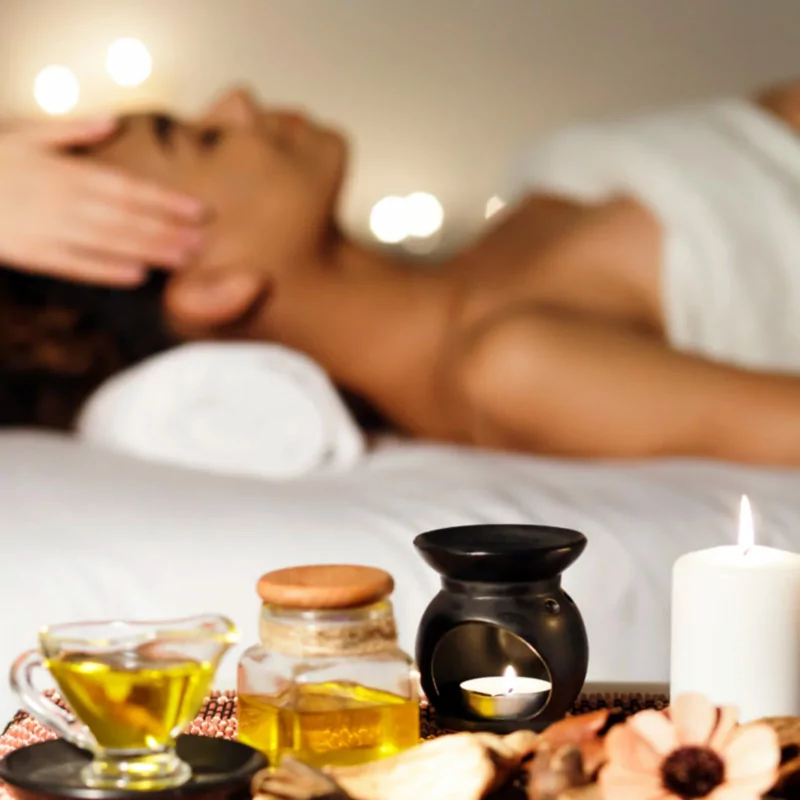Perfume and our emotions - how do fragrances affect our moods?
How do fragrances affect our mood?
Smells affect our mood and emotional state by acting directly on our limbic system, which controls our emotions, memory and behavior. Here are some of the ways scents affect our mood:
- Improve mood: scents such as citrus, lavender, mint and eucalyptus have stimulating and refreshing properties that help improve mood, increase energy and reduce stress.
- Relax and calm: aromatic oils, such as lavender oil, geranium oil or patchouli, have relaxing and soothing properties that help reduce anxiety and improve sleep quality.
- Enhance memory and concentration: fragrances such as rose, jasmine or peppermint have memory and concentration-boosting properties, which can be helpful when working or studying.
- Arouse romantic and erotic feelings: fragrances such as ylang-ylang, patchouli or vanilla are considered aphrodisiacs, which help arouse romantic and erotic feelings.
- They aid meditation and spiritual practices: fragrances such as frankincense, myrrh and sage are used for spiritual and meditative purposes, as they help bring the mind into a state of focus and relaxation.

The sense of smell is often less appreciated than hearing or sight.
Olfactory memory is one of the hidden powers of the brain. The work of olfactory cells influences our emotions, mood and physiological reactions. That's why the smell of cut grass brings to mind vacations spent in the countryside, and the scent of gingerbread is associated with a family home and a sense of security.
Olfactory memory can be particularly strong for smells associated with childhood events, which are often identified with smells associated with home, food or play. However, olfactory memory can also be associated with other events and experiences, such as romantic encounters, vacations, or important family events.
As such, olfactory memory has many applications, both in personal and professional life. In medicine, psychology and therapy, it is used to treat addiction, neurodegenerative diseases and anxiety disorders, among others. In business, on the other hand, olfactory memory can be used for branding, interior design or creating scented products.

A scent that boosts self-confidence
There is no one-size-fits-all scent that boosts self-confidence, as what is associated with self-confidence can be subjective and dependent on individual preferences. Nonetheless, certain scents are considered particularly effective at adding confidence, as they have stimulating and refreshing properties that can help boost energy and improve mood.
Here are some scents that are often associated with self-confidence:
- Sandalwood - this scent is associated with meditation and calmness, which can help calm and reduce stress levels, which in turn can boost confidence.
- Patchouli - this scent is associated with earth and nature, which can help you feel stable and confident, and has a relaxing and soothing effect.
- Peppermint - this scent has refreshing and stimulating properties, which can help boost energy and improve mood.
- Citrus - the scent of citrus, such as oranges and grapefruit, has stimulating and refreshing properties, which can help increase energy and improve mood.
- Jasmine - this scent is associated with romance and exoticism, which can help inspire a sense of attraction and confidence.
Also check out: what Armani Code Parfum smells like

Aromatherapy vs. perfume
These are two different approaches to scents, although both are used to influence mood and well-being.
Aromatherapy is a branch of natural medicine that uses plant scents, known as essential oils, to treat a variety of health ailments and to improve well-being. Essential oils (a less commonly used term) are extracted from plants by distillation or extraction and then used in various forms, such as for inhalation, bathing, massage or spraying into the air. Essential oils have various therapeutic properties, such as antibacterial, anti-inflammatory, sedative, stimulant or relaxant properties.
Perfumes, on the other hand, are fragrance blends that are primarily used to provide a pleasant scent to the body and clothes. Perfumes can contain natural ingredients, such as essential oils, but also synthetic chemical ingredients. Perfumes have varying degrees of concentration and longevity, from gentle eau de toilette to intense perfumes.
Compared to aromatherapy, perfumes are not used for therapeutic purposes, but can affect mood and well-being through emotional and aesthetic aspects. Many people use perfumes to feel more attractive, confident or just to smell good. Certain fragrance ingredients, such as jasmine or rose, are associated with romance and sex appeal, while others, such as mint or citrus, are more stimulating and refreshing.

Topical application of essential oils
Before applying, make sure it is suitable for your skin type and will not cause irritation. They should always be diluted in vegetable fats or other carriers, such as water, to avoid skin reactions. Usually about 2-3 drops per tablespoon of vegetable fat are used.
Topical application can provide many health benefits. For example, lavender aromatic oil can help relieve headaches, migraines or muscle tension when applied to the temples and neck. Tea tree essence can help fight acne and other skin problems when applied to affected areas of the skin. Peppermint extract can help relieve intestinal pain or indigestion when applied to the abdomen.
However, it is worth remembering that they are highly concentrated and should be used with caution to avoid side effects. They should not be applied directly to the skin in inappropriate amounts or consumed orally without the advice of a doctor or specialist. Before applying to the skin, perform an allergy test to ensure that it will not cause allergic reactions.

Aromamarketing - scents that make good associations
Aromamarketing is one of the fields of marketing that uses scents to influence consumers and build positive associations with a brand or product. Scents can influence consumers' emotions, behavior and decisions, which is why more and more companies are using aromamarketing in their marketing strategy.
Well-chosen scents can help build positive associations with a brand or product. For example, the smell of fresh bread is associated with home and family, while the smell of citrus is associated with energy and refreshment. Therefore, many bakeries or cafes use these very scents to reinforce their brand and attract customers.
In aromamarketing, it is important that the scents are chosen appropriately for the brand and products. Some scents may work more to attract consumers than others, and some scents may be more appropriate for certain industries, such as hotels or clothing stores.
It is also important that fragrances be subtle and not overpowering so as not to irritate consumers. That's why many companies use subtle fragrances or spray them only in specific areas, such as the reception area or store shelves.
Also check out: Gucci Rush Perfume Review

What effect does knowing that our favorite scent is trailing behind us and being smelled by the people around us have on us?
Awareness that our favorite scent is pulling at us and being smelled by people around us can affect our behavior and well-being in many ways. Here are some possible effects:
Increased self-confidence - knowing that our scent attracts the attention of others can make us feel more confident and attractive.
Improved mood - our favorite scent can be associated with positive emotions and memories, so smelling it in our surroundings can put us in a good mood.
Attention and interest from others - when people smell our scent, they may be more inclined to pay attention to us and interact with us.
Rivalry and social pressure - knowing that our scent is smelled by others can create social pressure and a sense of competition with other people who wear their favorite scents.
Discomfort - in the case of an unpleasant odor, knowing that it is smelled by others can cause discomfort and feelings of insecurity.
The impact of our scent on other people and our surroundings is complex and depends on many factors, such as individual preferences, culture and social context. Therefore, it is worth remembering subtlety and moderation in the use of perfume and respecting other people's private space.



Leave a Reply Cancel Reply